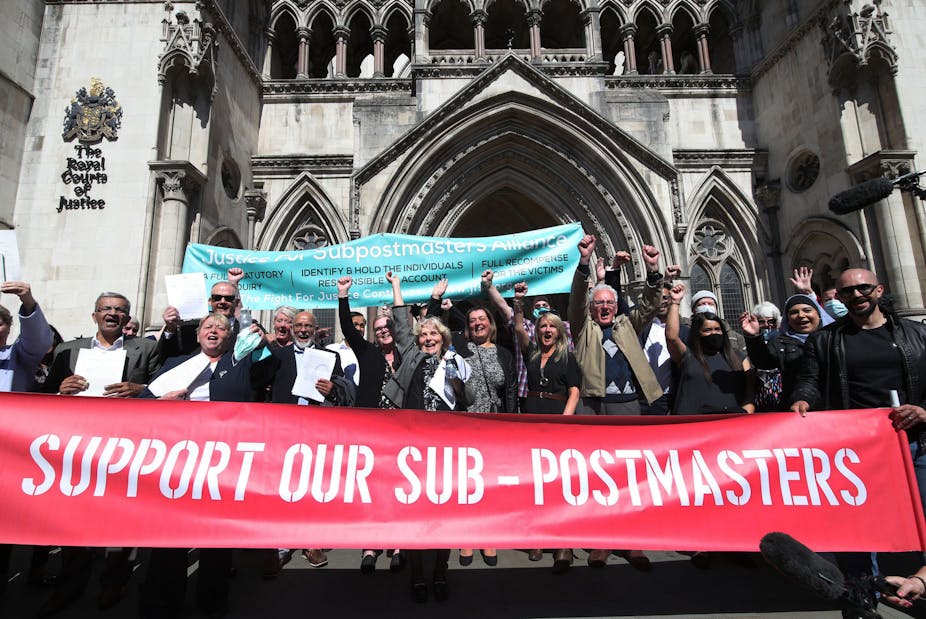Like most public inquiries, the probe into the Post Office Horizon IT scandal operated outside of the limelight for most of its existence. The release of ITV drama Mr Bates vs the Post Office has changed that.
The programme has ratcheted up public awareness of the scandal, which saw over 700 subpostmasters and postmistresses wrongly disciplined because of accounting shortfalls. Some employees went to prison for false accounting and theft, others suffered financial and reputational damage.
Legal challenges brought against the Post Office later revealed that many of the shortfalls identified by Horizon IT were caused by bugs in the electronic-point-of-sale system. The Post Office had been aware of this and had not disclosed it. Public consternation prompted the government to call, in September 2020, for an independent, judge-led public inquiry.
Inquiries are the government’s favoured response to matters of public concern. Sometimes they investigate high-profile events, such as the current COVID inquiry into the government’s pandemic response, sometimes matters of only moderate salience.
The success of Mr Bates has led to increased scrutiny at a pivotal moment. As of January 2024, the inquiry has moved into its final phase, which examines legal action against sub-postmasters and others. This is arguably the most politicised and significant part of the investigation.
Lessons to be learned
Public inquiries are meant to take the heat out of highly politicised issues and examine matters in an orderly and objective way. This new public awareness of the scandal therefore presents several challenges for the inquiry.
The final stage of the inquiry’s proceedings being subject to greater scrutiny is likely to be consequential.
As the name suggests, inquiries are about asking questions and learning lessons. Above all else, they are intended to prevent reoccurrence of mistakes and injustices, rather than being consumed by discussions of blame.
This is not the role of media coverage, which instead highlights the scandalised nature of issues under inquiry. Issues of blame and culpability, and the testimony and conduct of individual witnesses are therefore the focus of headlines.
This can mean that, when inquiries release their reports, public focus is on whether people have “got off alright” in the report, or have been criticised. A focus on these aspects risks overshadowing the valuable lessons that the inquiry has learned.
Read more: COVID inquiry: how it works, and when we will know if it is successful
Inquiries are meant to inform political responses to crises through their recommendations. Because of this, governments often claim they cannot address the issues until the inquiry reports. More cynically, inquiries are sometimes alleged to kick issues into the long grass because they take so long to report their findings.
However, the release of the ITV dramatisation has prompted the government to legislate on the matters of compensation and exoneration for postmasters immediately.
This risks preempting the inquiry’s findings, which are likely to address these issues. Without taking account of the inquiry’s report, the government’s response may not be as good as it could be. It is also possible that the inquiry’s findings might more fundamentally contradict what the government chooses to do now.
Media coverage of miscarriages of justice
The explosion of public attention on the Post Office scandal shows that media coverage can shape how similar scandals are investigated and responded to. Victims of the Horizon IT scandal have welcomed the increased attention that the ITV drama has brought. Others have asked why it has taken a television drama to finally spark action on long-running miscarriages of justice.
Those affected by other scandals have expressed frustration that the government appears much less interested in acting to secure justice for them. For example, the contaminated blood scandal, in which thousands of people with bleeding disorders were infected with HIV and hepatitis through the use of contaminated clotting factors in the 1970s and 80s. This scandal also involves significant harm and loss of life, and affected far more people than the Post Office scandal.
But in that case, which hasn’t been depicted on television, the government has appeared much more willing to rely on a slow-moving, delayed public inquiry as the means of responding to the scandal and determining how victims are compensated. The current inquiry into the contaminated blood scandal is itself the second investigation of the issue, has been in progress since 2017, and the release of the final report has been delayed until May 2024.
It is worrying that the government has only now acted on the Post Office scandal because of “public interest and public knowledge”.
That a drama addressing a serious miscarriage of justice has rallied public and political attention is testament to the political power of art. However, that it has taken the drama to put justice on the table reveals the government’s own sluggishness when dealing with injustices. That notoriously slow public inquiries are the more typical responses to scandals in Britain is precisely what can leave the needs of victims unaddressed for far too long.
This article has been corrected to clarify that those wrongly disciplined for accounting shortfalls are subpostmasters, not Post Office employees.

